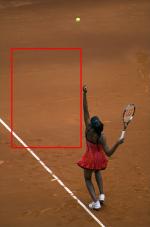


Hindi Visual Genome
Hindi-English Multimodal Dataset
Hindi Visual Genome is a multimodal dataset consisting of text and images suitable for English-to-Hindi multimodal machine translation task and multimodal research. We have selected short English segments (captions) from Visual Genome along with associated images and automatically translated them to Hindi with manual post-editing, taking the associated images into account.
The training set contains 29K segments. Further 1K and 1.6K segments are provided in a development and test sets, respectively, which follow the same (random) sampling from the original Hindi Visual Genome. Additionally, a challenge test set of 1400 segments was prepared for the WAT2019 multi-modal task. This challenge test set was created by searching for (particularly) ambiguous English words based on the embedding similarity and manually selecting those where the image helps to resolve the ambiguity. The surrounding words in the sentence however also often include sufficient cues to identify the correct meaning of the ambiguous word.
Dataset Sample
Sample ambiguous word: court (the key different meanings are court of justice vs. tennis court). As the image example illustrates, the word alone is ambiguous but already the English caption may contain sufficient information to disambiguate the word; the image is thus not always necessary for correct translation even in our challenge test set.
Download Link
- Hindi Visual Genome 1.0 (used in WAT 2019 Multi-Modal Task)
- Hindi Visual Genome 1.1 (used in WAT 2020 Multi-Modal Task, WAT 2021, and WAT 2022 Multi-Modal Task)
How to cite
If you use this corpus, please cite the following paper:
@article{hindi-visual-genome:2019,
title={{Hindi Visual Genome: A Dataset for Multimodal English-to-Hindi Machine Translation}},
author={Parida, Shantipriya and Bojar, Ond{\v{r}}ej and Dash, Satya Ranjan},
journal={Computaci{\'o}n y Sistemas},
note={Presented at CICLing 2019, La Rochelle, France},
year = {2019},
volume = {23},
number = {4},
pages = {1499--1505},
issn = {1405-5546},
}

